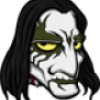
Sono contento che il mio personaggio preferito sia anche il suo.

Le interviste per il Goblin Magnifico proseguono con Kevin Riley, autore americano che alla prima esperienza ha piazzato un colpo come Aeon's end.
1) Facci sapere qualcosa di te: che tipo di giocatore sei? Parlaci dei tuoi giochi preferiti (non realizzati da te).
Prima di iniziare a progettare Aeon’s end ho giocato a livello professionale al videogioco di Starcraft 2, per diversi anni. Il mio primo boardgame è stato Ascension, Dominion è in breve diventato il mio preferito.
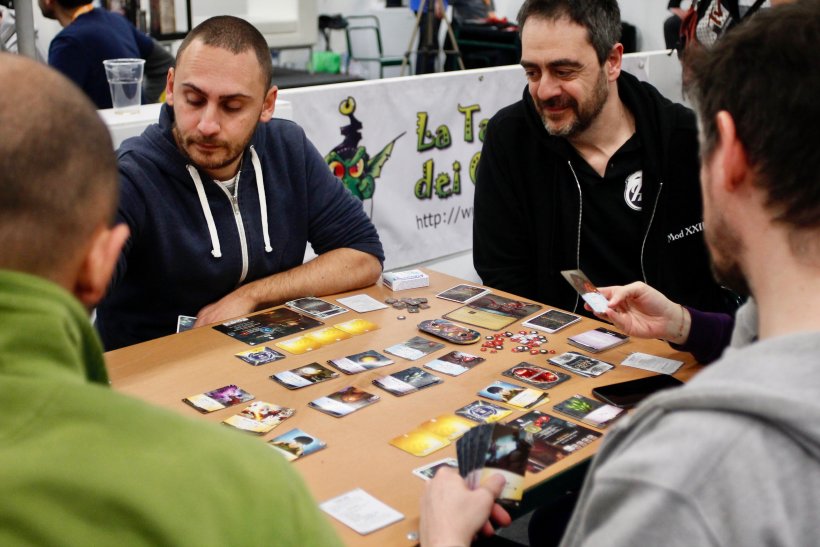
2) Il mazzo che non si mischia è indubbiamente la caratteristica distintiva di Aeon’s end. Perché hai messo delle limitazioni agli ordini degli scarti: prima gli incantesimi, poi le carte acquistate, per ultimo le carte giocate? Sembra una restrizione forzata, che limita la fantastica idea di un totale controllo del mazzo degli scarti.
Troppe opzioni possibili si traducono in paralisi da analisi – se ai giocatori vengono fornite troppe cose tra cui poter scegliere tenderanno a rallentare e a far ristagnare il gioco. L’idea di non mescolare il mazzo è pensata per dare ai giocatori un livello extra per il controllo, ma con delle limitazioni, per impedirgli di considerare tutte le opzioni con cui scartare le carte.
3) Ogni Nemesi si gioca in modo diverso e la combinazione di carte tra eroi e mercato comporta tante possibili combinazioni. Come hai bilanciato il tutto?
Il bilanciamento è passato per ore e ore di playtest. Inizialmente è stato gestito in casa. Una volta raggiunta una certa stabilità con le varie parti del gioco abbiamo iniziato a farci aiutare da playtest esterni. Con il lavoro combinato degli sviluppatori interni e i playtester esterni abbiamo raggiunto un ben rifinito risultato finale.
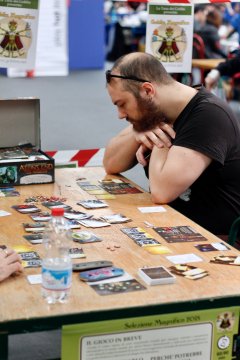
Spesso durante il playest selezionavamo il mercato perché c’erano carte specifiche che volevamo testare. A parte ciò, tendenzialmente, prendevo le carte che volevo provare, o quelle che sembravano funzionare bene insieme. Raramente ho sperimentato un mercato scelto a caso e non ho idea se questa cosa possa piacere ai giocatori. Le regole sono intenzionalmente vaghe su come “dovresti” giocare perché pensiamo che ogni gruppo di gioco possa interpretarle come preferisce. Se affronto una nemesi particolarmente ostica mi piace scegliere una per una le carte e trovare una strategia vincente.
5) Accanto al mazzo di scarti controllato il gioco propone un ordine di turno casuale. Quindi quello che si guadagna da un lato si perde dall’altro: perché questa scelta?
Ci è davvero piaciuto il mazzo di scarti in stile “nastro” senza mischiare, ma i primi test hanno rivelato che il gioco era per alcuni un po’ troppo deterministico. Quindi, abbiamo cercato altre parti del gioco per iniettare ulteriore varietà e imprevedibilità. Il mazzo degli ordini di turno è nato da questo e si è rivelato un successo tale che non abbiamo mai pensato di eliminarlo.
6) Qual è il tuo mago preferito e qual è la nemesi che preferisci affrontare?
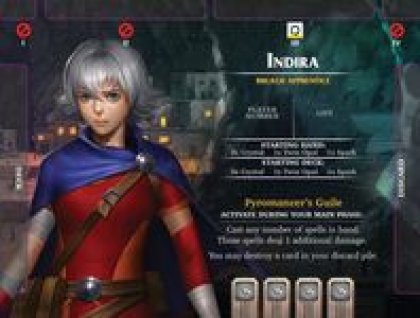
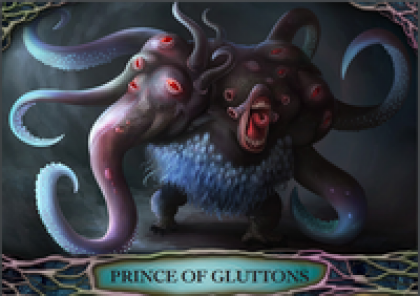
7) Quanto pensi pesi la fortuna e l’abilità in questo gioco?
Aeon’s end è decisamente più sbilanciato sul lato abilità rispetto a molti altri giochi del genere. Hai molte scelte da prendere ogni turno, hai molti modi di programmare i turni futuri gestendo la pila degli scarti, puoi scegliere di tenere delle carte in mano, e così via. Detto ciò ci sono combinazioni di carte e sequenze di turni nemesi che sono difficili da superare, anche per i veterani. In sintesi la mia risposta è: abbastanza fortuna e abbastanza abilità, quanta ne serve al gioco.
8) Kickstarter, Legacy, applicazioni per SmartPhones. Tre cose che sembrano invadere e cambiare il mondo dei giochi da tavolo. Hai un parere positivo o negativo su ciascuno di essi?
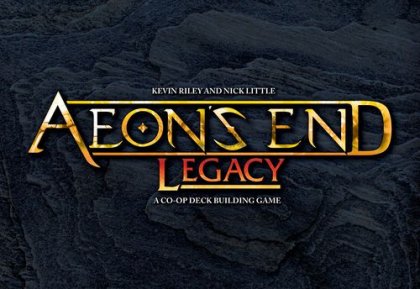
Per quanto riguarda i Legacy, ce ne sono così pochi che è difficile predire quali saranno gli effetti a lungo termine. La mia preoccupazione principale è che gli editori potrebbero non valutare correttamente quanto sia difficile sviluppare un Legacy, il che si tradurrà con prodotti a basso valore che entreranno nel mercato.
È bello poter giocare a un gioco da tavolo in app, ma preferisco decisamente giocarlo con altre persone. Siamo pieni di videogiochi, dei giochi da tavolo preferisco l’aspetto sociale. E le app remano in direzione contraria.
9) Hai giocato gli altri sette selezionati del nostro premio? Cosa ne pensi?
Purtoppo no, non ho giocato a nessuno degli altri 7. Quasi tutti i giochi a cui gioco e a cui ho giocato negli ultimi due anni sono giochi su cui lavoro, o ricerche di mercato per giochi su cui lavoro. Al di fuori delle convention è raro che giochi a qualcosa per pura curiosità.
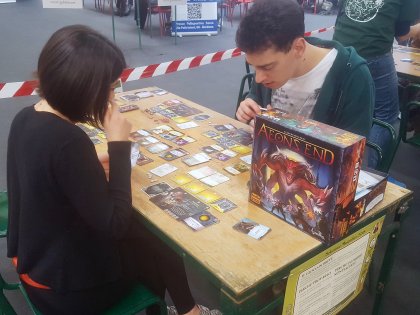
Ho da poco iniziato a parlare del futuro di Aeon’s End. Sto anche lavorando a un gioco stile Hanabi, ma siamo lontani, non so quando potrà vedere la luce.
Ci sono anche dei piccoli altri progetti, ma dopo Aeon’s end Legacy ho passato una fase di stasi- per prendermi una pausa e rilassarmi. Lo sforzo finale che ha richiesto questo lavoro impone il suo dazio da pagare, per cui mi sono preso una bella vacanza durante la quale ho anche giocato a tanti videogiochi. Ultimamente mi ha appassionato Heroes of Storm. E ho anche fatto un viaggioa Buenos Aires con la mia fidanzata, che aveva una conferenza lì.
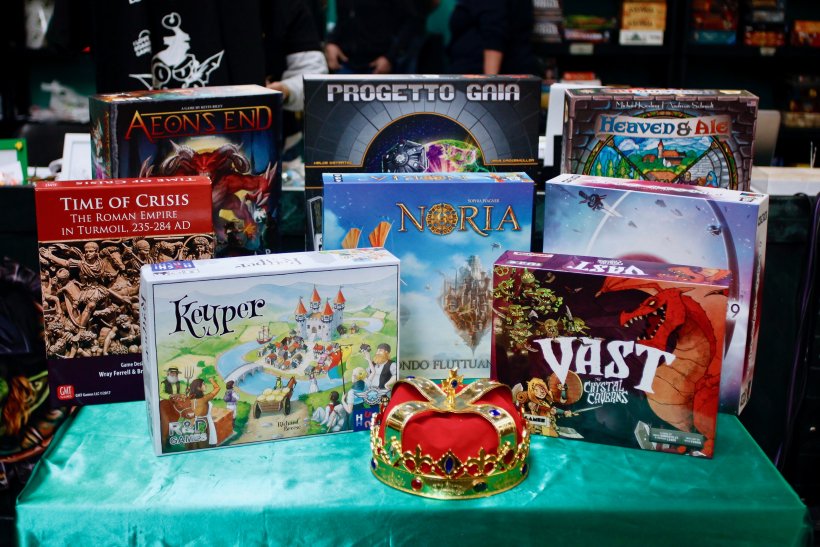
1) Tell us something about you: what kind of player are you? Tell us your favourite games (not made by you).
Before I started designing Aeon's End, I played Starcraft 2 professionally for several years. The first board game I ever played was Ascension and Dominion quickly became one of my favorites.
2) The unshuffled discard pile is certainly the distinctive trait of the game. However, why did you limit it with the rule of discarding spells first, then purchased cards, finally played ones? It sounds like an artificial restriction, limiting the beautiful idea of the controlled and programmed discard pile.
Too many options creates analysis paralysis - when players are presented with too many things they can do, they tend to act slower and the game bogs down. The no shuffle system is designed to give players an extra level of control but in a constrained way such that the game won't slow down because of all the possible ways they can stack their deck and cards.
3) Every Nemesis plays in a different way and the combination with supply and heroes bring the game to a huge amount of configurations. How did you balance the whole thing?
Balance of Aeon's End came through many many hours of playtesting. Initially, all designs start in house. Once we feel certain parts of the game have reached a stable enough point, we enlist the help of others to blind playtest. Using the combined feedback of our internal work and the external testers, we're able to come to a finely tuned finished product.
4) About the supply cards there is not a precise indication of how to select the cards (random? players choice?). With a random selection, I think you can have, in the case of high-level nemesis, impossible missions, with a sure defeat. What resulted from the playtest sessions?
Often while playtesting, we would select the market as there were always specific cards we needed to test. Barring that, I tended to test by selecting cards that I wanted to play with or cards that seemed interesting together. I rarely experimented with an all random market and didn't accurately predict how popular that variation would be among some of our players. The rules are intentionally vague in how you 'should' play because we expected each group to have their own preferred method. When playing against a particularly challenging nemesis, I like to hand pick my team and mages to find a winning strategy.
5) Besides the controlled discard pile, you have chosen a random turn order. So what you get by a side, you lose by the other. Why this choice?
We really liked the treadmill style discard pile with no shuffling, but some early testing revealed that the game was a little too deterministic for some. So, we searched for other parts of the game to inject additional variety and unpredictability. The turn order deck was born out of this and turned out to be so successful that we never considered not using it.
6) What's your favorite hero? And your favorite nemesis to face?
My favorite mage is Indira because of how dramatically she alters your approach to the game. As the only character who has less than three breaches (she only has 1 and it's closed to start), she excels and falters under a very different set of conditions from the rest of the mages. I'm proud that we were able to design her successfully and how interesting she ended up being. As for nemeses, I'm quite pleased with the stranger nemeses that we made like Prince of Gluttons or Maiden of Thorns. Both of these nemeses interact heavily with the supply piles and force players to approach the game in a different way than most. Overall, I prefer the content that warps the foundation of what the game is allowing and often forcing an entirely different strategy than the usual.
7) How much do you think luck is important in this game and how much skill?
Aeon's End is definitely heavier on the skill side than many other games in the genre. You have a lot of options on every turn of what to do and many ways to setup future turns by how you stack your discard pile, which cards you hold in your hand and so forth. That said, certain combinations of nemesis turns and cards can lead to dire situations that are tough to overcome even for veterans. So, my answer is - enough of the game is skill, and enough of the game is luck for my preference.
8) Kickstarter, Legacy System, SmartPhones' Apps. Three things that seem invading and changing the world of boardgaming. Do you have a positive or negative opinion about each of them?
Kickstarter is a great boon to the boardgaming community when used well. It allows publishers to safely pursue new products as they can more accurately gauge how many copies to print without as much risk of sitting on a lot of unsellable stock. When used poorly, it creates weird incomplete retail products or promises to never be fulfilled. As for Legacy, there are so few legacy games out there that it's hard to say what the long term effects will be. My main concern is that companies will fail to appreciate how difficult it is to make a legacy game which will result in poor products entering the market. It's nice to be able to play a board game in app form, but I really prefer to play them with other people. There are many video games already out there that I enjoy playing so the main pull of board games is the social aspect. Apps take away from that.
9) Did you play the other seven games in the selection? What do you think about them?
I haven't played any of the other games unfortunately. Nearly every board game I play and have played for the last 2+ years has been either something I'm working on or market research for whatever it is I'm working on. Aside from conventions, it is rare that I get a chance to play things that I'm just curious about.
10) What new games are you working on? Tell us something about your future projects.
I've recently begun preliminary talks about the future of Aeon's End. I'm also working on a hanabi-like game that is quite far along. Not sure when that will be out.
There are also a few other small projects I'm investigating but after Legacy, I've largely been in a lull - just taking a break and recovering. The consistent crunch we went through to finish that product took its toll so I had a nice long vacation which involved playing a lot of video games. I've been pretty fascinated by Heroes of the Storm lately. I also went on a trip to Buenos Aires with my gf who had a conference there.
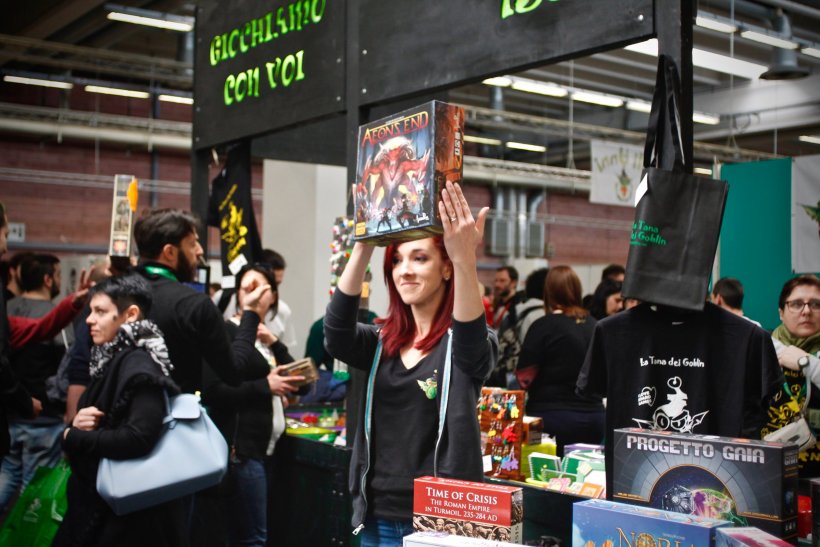

Sono contento che il mio personaggio preferito sia anche il suo.
approccio in qualche modo kniziano
Interessante vedere quanti dal mondo dei videogames si affacciano ai gichi da tavolo: qui non abbiamo un programmatore, ma uno che viene dai circuiti professionistici di Starcraft.
Nel fare l’intervista mi ha colpito il fatto che, di fatto, non è un giocatore (di boardgame) e ne conosce il minimo necessario per i suoi sviluppi.
Atra cosa:al pari di molti videogamer NON gli piace giocare a versioni elettroniche dei giochi da tavolo! (per inciso una bella app per giocare in solitario Aeon’s end non mi dispiacerebbe)
Sembra la dimostrazione del fatto che è meglio essere intelligenti che esperti per fare un buon gioco da tavolo. Ciò butta ancora più ombra sulle capacità dei precedenti autori di deckbuilding.
Le osservazioni di Peppe74 aprirebbero spazi a nuove discussioni. Aggiungo che magari è proprio il fatto che venga da quel mondo lì ad avergli aperto la mente a nuove idee
Sono contento che il mio personaggio preferito sia anche il suo.
Love is in the air
Grazie, bellissima intervista. Che dà risposte a tanti piccoli quesiti. Risposte semplici, quasi banali, che ci aiutano a capire come il design è talvolta più pratica ed intuizione, che pura teoria.
A cosa ti riferisci Rage, apriamo una discussione sul forum?
A cosa ti riferisci Rage, apriamo una discussione sul forum?
Beh al discorso che viene da una realtà parallela alla nostra. E che, come si vede dal sucesso del gioco, le paranoie di game design e convegni esagonali, a volte non servono a far si che venga fuori un bel gioco. Basta usare la testa e non vincolarsi a scelte dettate dall'approsimazione, come spesso di vedono in giochi fatti e finiti. Sarà anche la mentalità videoludica che ti porta a questa fase di ricerca di game design senza aver alcuna conoscenza accademica, ma tant'è che Kevin ha tirato fuori un capolavoro
Per scrivere un commento devi avere un account. Clicca qui per iscriverti o accedere al sito
Accedi al sito per commentare© 2004 - 2023 Associazione Culturale - "TdG" La Tana dei Goblin
C.F./P.IVA: 12082231007 - P.le Clodio 8, 00195 Roma
Regolamento del sito | Archivio | Informativa privacy e cookie | Contatti
La Tana dei Goblin protegge e condivide i contenuti del sito in base alla seguente licenza Creative Commons: Attribuzione - Non Commerciale - Condividi allo stesso modo, v.4.0. Leggi il testo sintetico, oppure il testo legale della licenza.